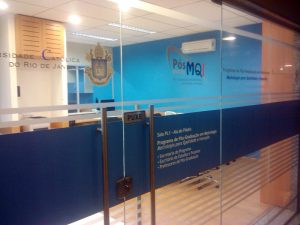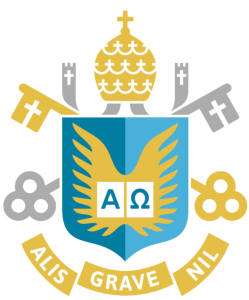Laboratories
 As a result of the interdepartmental effort that enabled the creation of the Program, PósMQI/PUC-Rio has access to an excellent physical and documentary infrastructure to support its technical-scientific activities: (i) laboratory infrastructure; (ii) computer support infrastructure and (iii) library and documentation infrastructure, with virtual access to important national and international databases.
As a result of the interdepartmental effort that enabled the creation of the Program, PósMQI/PUC-Rio has access to an excellent physical and documentary infrastructure to support its technical-scientific activities: (i) laboratory infrastructure; (ii) computer support infrastructure and (iii) library and documentation infrastructure, with virtual access to important national and international databases.
In the context of the broad institutional articulation that led to its consolidation, PósMQI benefits from an excellent and diversified laboratory infrastructure in several areas of knowledge.
The available laboratory infrastructure is described below:
– Biometrology Laboratory:
Dedicated to biomedical instrumentation and metrology applied to biosciences. Many of its lines of operation involve electrical, magnetic and optical measurements of bioelectric activity, as well as theoretical and simulated studies for the calculation of the electric and magnetic field generated by such activity. It is dedicated to the design and development of magnetic transducers based on the giant magnetoimpedance (GMI) effect, with high sensitivity and low cost for manufacturing and operation, intended for various biomedical applications, such as systems of locating metallic foreign bodies in the human body for guidance of the surgical approach, recording of arterial pulse wave, noninvasive detection of primary bioelectric activity.
It features a mobile patient bed, automated sample handling system, stepper motors, CC motors, LiPo batteries, heating and maintenance system of biological tissue samples, microcomputers and a sophisticated electromechanical instrument suite, including: Precision RLC meter (4285A, Agilent), biomedical safety analyzer (601 Pro, Fluke), multiparameter patient simulator equipment (MPS450, Fluke), AD/DA multichannel systems for data acquisition (NI USB-6221 and NI USB-6229), DC power supplies, signal generators, oscilloscopes, gain-phase meter, precision scale, triaxial fluxgate magnetometer (FVM-400, MEDA), multimeters, tablet, GPIB/USB interface, digital stethoscope (4000, Littmann), bench top watercolor, digital caliper, electrocardiograph and multichannel temperature transducer (8 channels). In addition, through resources from CAPES, FAPERJ, CNPq and FINEP agencies for biomagnetic measurements, it was equipped with a monochannel ultra-sensitive magnetic transducer, in gradiometric configuration, type SQUID (601-MFP, Tristan) and, for in-vitro testing, with a magnetically shielded cylindrical chamber, by 3 layers of mu-metal and 1 layer of aluminum, 1 m in diameter and 1 m high (Magnetic Shields Ltd).
The Laboratory also has several software that helps the developments made, such as Matlab R2021, LabVIEW 2012, Multisim 11.0, TopSpice 7.17e, CircuitMaker 2000, AutoCAD 2011, ViziMag 3.191 and COMSOL Multiphysics 3.5.
– Laboratory of Research and Development in Electronics (LPDE):
Several research projects developed in the field of exact engineering and sciences in general require electronic circuits with special characteristics, associated with their respective application sector and the intended advances. The LPDE was created through a collaboration between the Department of Electrical Engineering and the PósMQI and aims to act in the design and development of such circuits, contributing to the development of scientific research projects that require electronic instrumentation and, consequently, fostering multi-departmental and multi-institutional collaboration.
The laboratory team aggregates the knowledge of researchers from various areas of engineering, thus enabling the development of complex systems that require this type of collaborative work. The works developed unite pure and applied research, meeting the demands and interests of the market.
The available infrastructure has a sophisticated electromechanical instrument suite, containing: microcomputers, Generator of arbitrary waveforms: 4 analog channels, 36 digital channels, 16 bits, 125 MHz (ArbStudio 1104D, Lecroy), Lock-In Amplifier 200 MHz (SR844, SRS), DC power supplies (PS-6000, PS-5000 and PS-4000, ICEL; 6281A and 6920B, HP), DC power supply controllable via GPIB interface (E3648A, Agilent), signal generators (3320A, Agilent and 8111A, HP), high-resolution oscilloscope (HRO 64Zi, Lecroy), oscilloscopes (54603B, HP and CS-4125, Kenwood), PCB prototyping for circuit printing on flexible and rigid substrates (S103, LPKF), semi-automatic Pick&Place for assembly of SMD components (ProtoPlace S, LPKF), Voltage Source/Precision Current (100 nV-210 V / 10 fA-10, 5 A, 31.8 W) (B2962A, Agilent), Complete Rework Station with welding and dewelding tools (I-CON VARIO 4, ERSA), phase gain meter (3575A, HP), digital welding station (WD1, Weller), precision scale (MARK 500, BEL), multimeters (87 V, Fluke; IK-1000A, ICEL; and DM27XT, Wavetek), tablet (34180, Calcomp), GPIB/USB interface (82357B, Agilent), digital caliper (CD-8” CSX-B, Mitutoyo), digital external micrometer 0-25mm (110,284, Digimess), spectrum analyzer (SR785, Stanford Research Systems), 30 cm diameter uniaxial Helmholtz coil, temperature bath with controllable temperature (DC1-B3, Haake), multichannel temperature transducer (10 channels) based on high-precision PT-100 sensors (TERMAX 5, IOPE Precision Instruments). There are also several software sands that help the developments made, such as Matlab R2021a, LabVIEW 2011, Maple 14 Professional, Multisim 11.0, TopSpice 7.17e, CircuitMaker 2000 Professional Edition SP1, AutoCAD 2011, ViziMag 3.191, COMSOL Multiphysics 3.5 and Maxwell 14.
– Solar Energy Laboratory (LES):
To strengthen the research line ‘Smart Grid’, a new Solar Energy Laboratory was built in 2019, having a relevant role to improve students’ teachings on two very relevant topics nowadays, solar photovoltaic energy and energy storage. So far, in this laboratory, monocrystalline photovoltaic solar panels have been installed with a common inverter.
In 2021, 2 more module technologies, polycrystalline and mono-PERC were installed, in addition to a new hybrid inverter, enabling batteries to be installed in the future. The modules will be supervised one by one, after AC/DC converters are installed, thus enabling the measurement of the power of the panels per module. In addition, temperature measurement devices will be connected to the modules (thermocouples) and also a device for measuring the state of the sky (cameras), because in future research it is intended to predict solar generation from images of clouds (skyscanner). This laboratory also has measurement devices for automatic measurement of the load state curve and health status of lithium-ion cell cells, making it possible to do tests and research with this theme. This laboratory is also used by students of extension courses and Lato Sensu in Solar Energy offered by PósMQI.
– Temperature Laboratory:
PUC-Rio’s temperature laboratory was the first in 1988 to be accrdited in Brazil to provide temperature meter calibration services. Its uncertainties registered in the Brazilian calibration network (RBC) are: (a) 0.1 °C, for temperatures between -50 °C and 100 °C, (b) 0.2 °C, for temperatures between 100 °C and 200 °C, (C) 0.3 °C, for temperatures between 200 °C and 300 °C.
– Pressure Laboratory:
The PUC-Rio pressure laboratory is accredited in Brazil to provide pressure meter calibration services. It has (a) a pressure scale with uncertainty of 0.015 % of the value measured in the range up to 1200 bar, (B) a set of masses with values of 1, 2, 5, 10, 20, 50, 100, 200 and 500 g, class F1, to improve the scale resolution, up to 60 bar, for 0.001 bar, (c) a 20 kg mass set of class M1 to calibrate scales, (d) a differential pressure scale for calibration of differential pressure transmitters up to 2 bar, with uncertainty of 40 ppm + 0.0013 psi, used in orifice hole flow meters, at line pressure up to 200 bar, with adjustment uncertainty of 0.25% of the amplitude of the meter, filling a laboratory gap in Brazil.
– Dimensional Laboratory:
The laboratory is intended to inspect orifice plates according to the ISO 5167:2003 standard to be used in the measurement of custody transfer of natural gas, and thus meet the needs of industries in Brazil and companies that sell this product, in line with the guidelines of Joint Ordinance No. 1 ANP/INMETRO and ABNT standards. It has measuring instruments for dimension, flatness, perpendicularity, roughness, image projectors.
– Flow Computer Laboratory:
The laboratory aims to test flow computers (FCs) of oil, its derivatives, natural gas and alcohol, used in PETROBRAS’ fiscal measurement, appropriation and custody transfer systems.
– Humidity Laboratory:
The laboratory is dedicated to the calibration of humidity meters. It has a climate chamber, a standard dew spot meter and a digital barometer.
– Liquid Flow Metering Laboratory:
It consists in a circuit of pipes and storage reservoirs for the calibration of liquid flow meters up to 50 m³/h. It has an ultrasonic flow measurement standard with of uncertainty 0.2 % and gravimetric standards. It has a section of accidents to test the performance of meters with developing flows, especially of the non -intrusive type.
– Chemistry Laboratories:
Laboratories in the field of Analytical Chemistry (inorganic and organic), with state-of-the-art equipment in instrumental analysis: UV-VIS-IV, GC-MS, ICP-MS, ICP-OES, AA, X-ray fluorescence, nuclear (alpha -beta-gamma), NMR, Raman, HPLC, polarography and other techniques.
– Dimensional Metrology Laboratory:
Accredited by Inmetro, it is part of the Brazilian Calibration Network (RBC) since the beginning of its creation, institutionally linked to the Technological Institute (ITUC/PUC-Rio), performs standard block calibrations, external and internal lengths in specific instruments, angular measurements, calibrators of all kinds of threads, planicity, and parallelism (roughness and gears, not accredited). Collaborates with research centers from other areas, such as dentistry, material science, physics, chemistry, etc.
– Force Laboratory:
Accredited by INMETRO, therefore a member of the Brazilian Calibration Network (RBC), the Technological Institute’s Force Laboratory (ITUC-PUC-Rio) has a technical competence and laboratory infrastructure to work in the development and qualification activities of standards, load cells and general use measurement instruments.
– Mechanical Tests Laboratory (LEM):
In the context of its extensive calibration laboratory infrastructure, LEM has the capacity to measure the quantity (i) Force, offering traceability through its INMETRO accreditation with the Brazilian Calibration Network (RBC) and (ii) calibration of testing machines and transducers (load cells), featuring an INSTRON 5500R universal testing machine (0 to 1 tf and 0 to 10 tf) and an AMSLER universal testing machine (0 to 10 tf; 0 to 20 tf; 0 to 50 tf and 0 to 100 tf), both with a maximum error class of 0.5%. With regard to its laboratory training for testing (static and dynamic), it has a WOLPERT machine, Probat model, for testing materials; Brinell, Rockwell (B and C) and Vickers hardness tests; dynamic fatigue tests with axial movement with capacities from 0 to ±50 kN (INSTRON 8504) to ±200 kN (INSTRON 8502) and INSTRON 8874 (axial movement up to ±25 kN and up to 100 Nm of torsion). Based on this laboratory training, and on a wide collection of standards and calibrated and certified load cells, it performs measurements of derived quantities (pressure, bending, torsion).
In addition to calibrations, LEM has infrastructure and works strongly in the area of material testing, both dynamic (fatigue) and static. In these, Metrology is always present, as measurements of force, length, temperature and pressure are carried out to perform them, which are fundamental to guarantee their quality.
All laboratories described above provide continuous support to PósMQI and other PPGs at PUC-Rio, notably at 2 PósMQI research lines with technological bias (instrumentation and measurement; smart grids), allowing tests and calibrations of varied quantities and the development of dedicated measurement systems, which are often research themes in metrology.
Computational support infrastructure
The program has excellent computational infrastructure of its own, with an internal network integrated with the university and available 24 h a day to the teaching and student bodies. Through its Center for Excellence in Informatics (RDC – Rio Data Centro), which has computational resources and applications directed to the areas of research and development (R&D) of the University, the program accesses strategic databases. With the support of other departments that cooperate with PósMQI, master’s students started using several licensed statistics and engineering applications for teaching and research purposes (Ansys, Fluent, Rampant, Matlab, Olga, Maple, LabView, etc.).
A study room that offers projection and multimedia resources, integrated internal network, access to the university’s virtual library system and its databases and microcomputers interconnected in network, providing internet access, is available to students seven days a week. The program also uses the Advanced Computing Laboratory, which offers the possibility of access to US supercomputer centers, and the University Language Center, which has adequate infrastructure for foreign languages.
Library infrastructure and available documentation
With a collection of more than 250000 titles, including books, monographs, theses and periodicals, the PUC-rio library system is considered one of the best in the State of Rio de Janeiro. Coordinated by the Division of Libraries and Documentation (http://www.dbd.puc-rio.br/sitenovo), the system is formed by the Central Library and three sector libraries: the Scientific Technical Center, Center for Social Sciences and the Center for Theology and Human Sciences. In addition to free access to all University Libraries, master’s students can also use the services available on the WEB page, such as: consultations, loans, reservations, renewal and comut (service that allows the request of copies of journal articles located in other institutions).
PUC-Rio has access to the CAPES Journal Portal from any computer installed in the institution’s domain, as well as from the home computers of its teachers, students and employees, through a remote access offered by the Library (http://testaremoto.dbd.puc-rio.br/sitenovo/area-restrita.php?a=1).
The Master’s Documentation Center has a collection of specialized publications (periodicals, theses, metrology dissertations, technical reports, congress annals, metrology event seminars). The Program also maintains an exchange with the Graduate Program in Metrology of the Federal University of Santa Catarina in Florianópolis, today functioning as a thematic area of the post-graduation of Mechanical Engineering.
New space for physical infrastructure
Hygiene, comfort and access to computer infrastructure are permanent concerns of the PósMQI Coordination. At the end of each school year the physical infrastructure of support, student room, classrooms and meetings of the Program undergo a review and maintenance works are carried out. Benefiting from the maintenance budget allocated by the University to the Program and resources raised by the provision of external services and overheads from sponsored projects, PósMQI/PUC-Rio keeps its physical and computational infrastructure up to date, which today has modern Secretarial facilities, comfortable rooms for teachers and students and space for researchers’ work associated with sponsored R&D Projects.

